
Rainbow Family of Living Light gatherers prepare for the annual July 4 Prayer for Peace in the main meadow at the 2017 gathering in Oregon.
Amanda Peacher / OPB
On a 90 degree evening in the Malheur National Forest, a 55-year-old woman trudged along a dusty Forest Service road toward the main meadow of the Rainbow Family of Living Light annual gathering. She wore a bikini top with tie-dye pants, and hoisted a box of raw bacon on her shoulder.
"Family members,” as Rainbow-goers refer to themselves, called out as she passed.
“Yeah, meat!” cheered a shirtless man.
“I’m bringing home the bacon!” said the woman, who, like many at the Gathering, went by a pseudonym: “It’s Not Lit,” she called herself, a reference to the joint she often keeps tucked between her lips.
It’s Not Lit was trucking the bacon to one of at least 20 makeshift camp kitchens at the Rainbow Gathering, an event that draws hippies, peace activists and vagabonds from across the country. This year’s event south of John Day in Oregon drew 13,120 campers — almost double the entire population of Grant County — much to the dismay of the Forest Service.
The agency and the gatherers are in a perennial tug of war over what campers can and can’t do on public lands. Every year, the gathering blooms to such huge numbers that officials can do little to stop it.
It’s Not Lit delivered the box of raw meat to the outdoor kitchen, surrounded by a hodgepodge of colorful tents among ponderosa pines. A tarp propped up by tall, dead branches covered a campfire where a few people talked intensely or strummed mandolins. Similar camps were dotted across the 3 1/2-mile radius of the gathering.
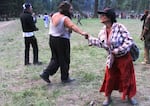
A California woman who goes by "It's Not Lit" fist bumps with a fellow participant at the gathering of the Rainbow Family of Living Light in the Malheur National Forest.
Amanda Peacher / OPB
All kinds of people flock to the gathering each year, from elderly hippies to idealistic college students. It’s Not Lit goes, in part, to mother the many homeless teens who end up there.
“They’re castaways,” she said. “You can see their wounds. They look like zombie movies. I’ve lost my own son, and these are all my children. My heart pours out to them.”
At the camp, someone drew attention to sunset festivities that were supposedly about to begin in the main meadow.
“Are you going to the wedding?” asked one woman.
“Of course,” said It’s Not Lit. “I always cry at weddings."
She hurried through the crowd toward a small wedding party that stood waiting for the bride and groom. One person held a wildflower wreath and a bride’s dress stitched together just that day, from extemporaneous lace and fabric. A young man clutched handfuls of wrapped candy to toss at the couple like wedding rice.
The bride and groom were not in sight.
“Misty!” shouted the man holding the wreath, over a cacophony of drums and chatter from the crowd. “Dirtbag! Time to get married!”
While she waited, It’s Not Lit fished into her pocket for a condom. “Time for some Grandma Magic,” she said, blowing into it and then tapping it above her head like a balloon. A tall, thin man strode by, swinging a six-foot hula hoop around his neck. A young woman crumpled to the ground mysteriously. Almost immediately, she was loaded into a wagon and toted to “Calm,” the first-aid area.
For regular Rainbow attendees like It’s Not Lit, the gathering fulfills a deep spiritual and emotional need. For many, it’s an escape from otherwise difficult lives. Rainbow gatherers say they accept and welcome everyone — social misfits, homeless teens, recovering drug addicts, emergency room surgeons and aging hippies. “Welcome home” they say to one another, strangers and friends alike.
Each camper has a different personal reason why they come, but the larger focus of the gathering is an ideal that dates back to the first gathering in 1972: world peace.
Still with no-shows for bride and groom, the would-be wedding spectators eventually wandered away, including It’s Not Lit. In the fading light, she meandered toward her camp to prepare for the next day. July 4 is the pinnacle of every Rainbow Gathering. From dawn till dusk, everyone is silent. There’s no drum circles, no slam poetry, no flutes, no verbal communication. Gatherers break the silence at high noon, after a communal prayer circle.
This was It’s Not Lit’s ninth gathering in about 20 years. In the small Southern California community where she works as a landscaper, she’s known as the town hippie. People laugh at her when she calls them “brother” or “sister.”
“They laugh at love,” she said. “I think they see it as silly. It hurts. We just need to accept each other.”
In years past, It’s Not Lit has broken her July Fourth morning silence only out of absolute necessity. But this year, she felt entitled to stay silent. She said she felt a deep need to make peace with herself, and to think about all that she was grateful for.
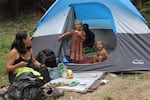
A Seattle family prepares for the annual kid's parade at 2017 gathering of the Rainbow Family of Living Light.
Amanda Peacher / OPB
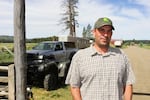
Rancher Justin Galbreath is permitted by the U.S. Forest Service to graze cows in the meadow where the 2017 gathering of the Rainbow Family of Living Light is taking place. He says he's frustrated with the gatherers' presence.
Amanda Peacher / OPB
For The Forest Service, Rainbow Is An Annual Headache
The Rainbow Gatherers weren’t the only ones looking forward to the morning of silence. The day would also be a welcome, quiet one for the dozens of Forest Service law enforcement officers who put in long hours trying to manage the unwieldy and unauthorized event.
The Forest Service knows to expect the gathering every year from July 1-7, but the Rainbow Family doesn’t settle on an exact location for their event until a few days before it starts. That’s in part because they don’t want the government to try and stop it.
“They’re very secretive, or I’d call them sneaky, about their site,” said Malheur National Forest Deputy Supervisor Ryan Nehl. After a Rainbow council announces the location on Facebook, thousands of campers immediately head that way. “It just doesn’t give us a chance to put protections in place, and so we’re constantly in a reactive mode,” Nehl said.
The Forest Service typically requires groups of 75 or more to get a special-use permit. An organized gathering as large as Rainbow requires an environmental analysis that might take two years. But the Rainbow gatherers buck those requirements by pointing out that they have no official leaders. They ask the Forest Service to treat them like thousands of dispersed campers who simply happened upon the same site.
Much to the agency’s frustration, there’s little the Forest Service can do to block the event. Instead, they go into high gear the moment they know the site location, flagging off sensitive wildlife habitat and giving the campers instructions for where to dig latrines for human waste.
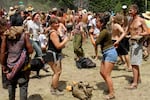
Dancers frolic in the main meadow at the 2017 gathering of the Rainbow Family of Living Light.
Amanda Peacher / OPB
“We’re treating this like a wildfire, a social wildfire if you will,” said Dave Halemeier, a Blue Mountain District Ranger for the Malheur National Forest. He worried about the gathering’s impact on wildlife, like nesting woodpeckers and baby redband trout in the stream that cuts through the main meadow.
This year’s 13,120 campers were fewer than the Forest Service predicted. Law Enforcement officials gave citations for drug use, camping too close to streams, assault and other violations. As of Thursday, they had arrested 15 gatherers. Two people died at the gathering — one collapsed for unknown reasons, another had a heart attack.
Approximately 50 Forest Service workers are diverted from their regular jobs to monitor the gathering. Each year the agency spends about $500,000 on law enforcement for the event, and the Malheur National Forest expected to spend at least an additional $250,000 on it, pulled from an already strapped budget. All of that was on top of a very busy summer in Grant County, as rangers prepare for hundreds of thousands of campers for the upcoming solar eclipse.
Rainbow gatherers argue that these are public lands, and they have a constitutional right to assemble.
“You can’t go into a city and feel the same welcoming that you do here,” said Dylan Forester, a dreadlocked musician from Kentucky. “It doesn’t matter if you have a thousand dollars in your pocket or not a thing except a five-day old cigarette butt. You’re welcome here.”
But many in conservative Grant County don’t join in that sense of welcome.
Rancher Justin Galbreath has a permit to graze his cows in the exact area where the gathering took place. The Forest Service let him move his cattle to an alternate meadow, but he worried about the future impacts of thousands of campers, in particular human waste.
Even though the gatherers typically abide by the Forest Service’s request to dig bathroom trenches far from water sources, the combined waste from thousands of campers over seven days would weigh about as much as four African elephants. That waste is now decomposing in dirt latrines across the site.
“If that stuff leaches into those creeks, that is going to affect us for a long time,” Galbreath said. He’s worried that if the water quality declines, the Forest Service could limit the number of cows he can graze in the future.
Galbreath visited the gathering and was dismayed to see the lush meadows where he normally turns out his cattle become trampled grass. He viewed the Forest Service’s dealing with the gathering as a double standard. A few years ago, he pointed out, he had to rehabilitate one of the meadows that was within the area of the gathering. His cows ate down the grass more than they were supposed to.
“We electric-fenced it the next year and let it come back,” he said.
This year, that area served as a parking lot for the gathering. “Now, that same meadow that we worked on so hard is full of cars and it’s just dust.”
The Rainbow Family does have a good reputation for packing out trash and helping repair the site once the crowds leave. Hundreds of campers stay behind to rehabilitate meadows and plant new vegetation. Some even return to the site the next year, to check for any lasting impacts.
But deputy Forest Supervisor Ryan Nehl said that repair work is more about the visible impact. “There are going to be subsurface and water impacts that are hard to see,” he said. “We won’t know the full effect of this gathering for years.”
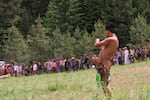
At high noon on July 4, Rainbow Family of Living Light gatherers hold hands in a giant circle and chant "Om." Nudity is allowed, but taking pictures during the pinnacle moment of the gathering is often frowned upon.
Amanda Peacher / OPB
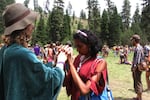
Gatherers pray and meditate together on July 4 at the annual gathering of the Rainbow Family of Living Light.
Amanda Peacher / OPB
Prayer For Peace
On the morning of July 4, the gathering site was already hot and dusty. Campers trickled into the main meadow all morning, some wearing special sparkly costumes or colorful face paint, others completely nude. Many sat cross-legged in the sun, eyes closed, in meditation.
With the sun beating down directly overhead, the thousands of people silently joined hands. Somewhere, someone — or probably several people — began chanting a low, humming "om."
When a parade of children entered the center of the circle, as they do every year of the gathering, the chanting erupted into a blissful cheer, punctuated by coyote calls and drums.
For It’s Not Lit, that was the moment she was waiting for.
“I come for the prayer,” she said. “Home is the people, home moves around. Welcome home,” she said, out loud in the meadow, shouting into the crowd.
She was speaking to both everyone, and no one, at the gathering.
